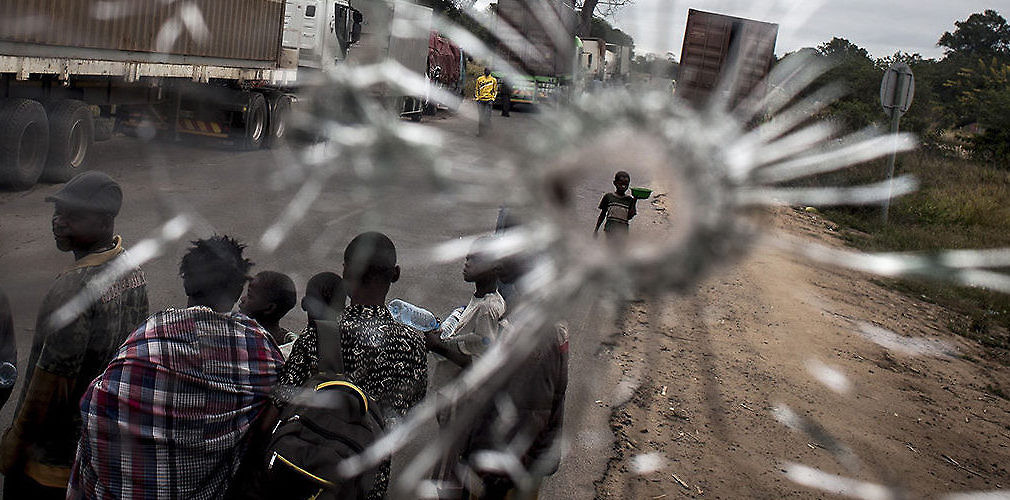Street vendors seen through a bullet-hole in the window of a vehicle attacked on the NH1 highway. Gorongosa, Mozambique, May 27, 2016. (John Wessels/AFP/Getty Images)
Mozambique’s armed forces last week committed to escort commercial vehicles traveling a 170-mile stretch of the EN7 highway in the country’s Manica province. This would mark the third time this year that the military has established mandatory convoys of this nature. It follows a sharp uptick in armed ambushes attributed to the Mozambican National Resistance (Renamo), as part of a wider pattern of lingering tensions between the movement and the Mozambique Liberation Front (Frelimo)-dominated government. The situation requires more fundamental attention to safeguard Mozambique’s economy and long-term peace and security.
The Armed Conflict Location Event Data has recorded more than 30 separate attacks either claimed by or attributed to Renamo this year. The majority of these have targeted passenger buses, which are accused of covertly transporting military units involved in armed operations against Renamo positions in rural central and northern Mozambique.
The current wave of violence is by no means novel. Following the conclusion of a 15-year civil war, Renamo and the Frelimo-led government have engaged in low-level conflict since late 2012, when rebel-turned-opposition leader Afonso Dhlakama announced his disengagement from electoral politics and returned to his war-time base in Gorongosa. Up until the signing of a tentative ceasefire in August 2014, the rebels similarly ambushed military and civilian vehicles along Mozambique’s highways. This invited retaliatory attacks by the military focused on encampments dotted along the hinterlands of the provinces of Sofala, Manica, Nampula, and Tete.
The 2014 ceasefire created a fragile peace that allowed Mozambique to rebuild its polity, economy, and society. Under the terms of the agreement, Dhlakama and Renamo would recommit to a pluralist democracy in exchange for a number of political and economic concessions, including the reintegration of their forces into the military and the establishment of a fund providing them with state patronage.
Fast forward to 2016, however, and much of the core clauses of the agreement have been left unfulfilled. Many Renamo combatants have not been assimilated into the state security apparatus but are instead claiming to be forcibly disarmed in a campaign they deride as breaching the terms the 1992 General Peace Accord. Furthermore, while a Peace and National Reconciliation Fund has been established to compensate decommissioned fighters, the Renamo leadership has questioned its organizational composition and the amount of resources allocated to it.
Key differences between the situation in 2016 and 2014, however, are that Mozambique has held elections in which Renamo accrued its largest percentage of the ballot since the advent of democratic polls in the country in 1994. Although Frelimo won the overall election, a wave of corruption scandals, in addition to Dhlakama’s claims that the ruling party was sliding toward authoritarianism, seemingly struck a chord with the Mozambican electorate.
Emboldened by its political ascendance and the success of its previous armed campaign, a resumption of low-level Renamo violence was predictable, as it sought to again strong-arm Frelimo back to the bargaining table. The ambitions and actions of both have since become more brazen. Renamo issued an April 1 ultimatum to have Mozambique’s resource-rich provinces Sofala, Tete, Manica, Inhambane, Niassa, and Nampula transferred to its authority. When the deadline predictably passed without this being granted, Renamo extended its campaign to the commercial sector.
In recent weeks, at least 12 trucks transporting commodities such as textiles and fuel were ambushed in Sofala and Manica. Two people were killed and an undisclosed amount of goods looted in the attacks. Highlighting the precariousness of the situation, Malawian Transport Minister Malison Ndau issued a directive for all commercial and mass transit vehicles to bypass Mozambican territory.
Violence has also spread from Mozambique’s highways to its rail network. In June 2016, gunmen opened fire on two locomotives transporting coal from Moatize to the port of Beira, leaving at least two people wounded and compelling Brazilian mining conglomerate Vale to opt to use a new rail network that meanders through southern Malawi.
Amid the devaluation of its currency, rising inflation, and the uncovering of more than $1 billion in hidden debt, the government cannot afford further attacks on its economy. A swift and decisive response to the Renamo threat will therefore be needed. Working in the government’s favor is the fact it is better equipped and financed than the opposition, which no longer has the patronage of governments from apartheid South Africa.
A strategy of simply attempting to crush the Renamo movement is allegedly favored by government hardliners. Counteroffensives targeting the opposition’s operational bases, in addition to at least two separate assassination attempts on Dhlakama, suggest that this option is being explored. Fighting violence with violence may, however, end up achieving exactly what the government wants to avoid: the depiction of Mozambique as a politically unstable country headed by an administration growing increasingly intolerant of its political opposition. This would have a further debilitating effect on international commerce. A likely more successful solution would be for the government to save face and again meet opposition forces at the bargaining table, even if the politically-rejuvenated Renamo is demanding a greater slice of the political and economic pie.
Whether Mozambique’s government will opt for the carrot or stick in response to opposition agitation remains to be seen. However, with President Filipe Nysui begrudgingly calling for international meditation to help end the impasse—a move also welcomed by Dhlakama—it appears that the ruling party may be preparing to pursue an option that could avoid wider conflict and instability.





